What does a "Scanner" see in me?
July 12, 2006
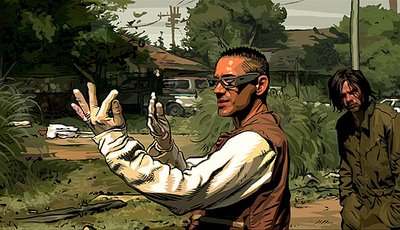
I went into “A Scanner Darkly” having not read the novel upon which it’s based. The trailer didn’t exactly clue one in to the story either—all I knew was that (a) it was shot using rotoscoping—that trippy colored-in live action type animation—so it would likely look awesome, and (b) the novel was written by Philip K. Dick, so it was probably futuristic science fiction.
What I didn’t expect was for the film/book to be more of a parable/allegory of Dick’s drug addiction rather than an elaborate science fiction story involving time travel and dual identities. Though there are themes of the latter, “Scanner” is more grounded in reality than one may expect, just a reality slightly in the future so there is some technology we do not have yet. In any event, what the film ended up being was a lot more lyrical and powerful than I was expecting, and in the end, a lot more of a rewarding experience than had it just been a simple mind-fuck.
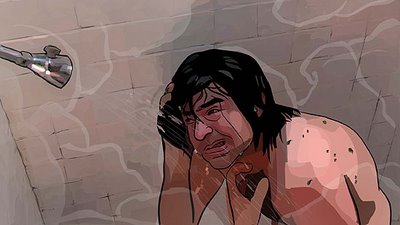
I certainly don’t want to fuck up the elaborate synopsis, so I’ll pull the official one from comingsoon.net:
“"A Scanner Darkly" is set in suburban Orange County, California in a future where America has lost the war on drugs. When one reluctant undercover cop is ordered to start spying on his friends, he is launched on a paranoid journey into the absurd, where identities and loyalties are impossible to decode.”
Um, yeah, so that didn’t help too much did it? Basically at this point in the future, there’s a plethora of people addicted to “Substance D,” a pill made from a purple (?) flower which often results in hallucinations and paranoia (as brilliantly shown in the jarring opening sequence). Keanu plays Bob Arctor, an undercover narc living amongst two drug-addled slackers (Robert Downey Jr. and Woody Harrelson), with a drug addict girlfriend named Donna (Winona Ryder) to boot. As expected, after much time undercover, Arctor has succumbed to the drug as well. Before long, he is not only spying on his “friends” but seemingly on himself as well. Somewhere in the mix is a visually stunning “scramble suit,” an eighteen speed bike and Woody Harrelson in a blond surfer dude wig.

Linklater has utilized rotoscoping once before in “Waking Life.” Despite being a fan of the director, I couldn’t tolerate watching all of “Waking Life.” After about 15 minutes of pretentious philosophical psychobabble, I fast-forwarded through the rest of the movie so I could still look at the pretty pictures without listening to the bullshit dialogue. “Scanner” is a lot more of a cohesive and linear experience, if still rather trippy in its own right.
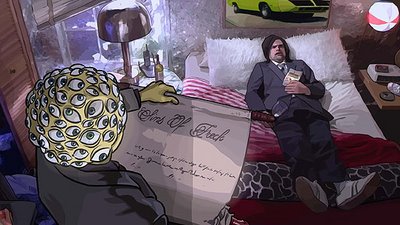
I’ve been asked by more than a few people: “should I go stoned?” While I’ve wavered, I’d have to come down on the “no” side. The visuals are trippy as hell, as well as facets of the story, but overall this is a movie more about the perils of drugs, and there’s a profound sense of tragedy throughout the third act, so drugs might only amplify any sense of sadness that may occur.
The beauty of “Scanner” is in its ever subtle shifts of tone and depiction of the hard-paid price of drugs without ever getting preachy or obvious. Until the closing crawl, one could far remove themselves from the themes and just view it as a futuristic yarn. “Scanner” is often hilarious, other times it fills you with paranoia, and as I mentioned, upon closure, it just leaves you sad (in a good way).
It’s a testament to the storytelling that one leaves the theater discussing the various themes and depths of the movie rather than the mind-blowing visuals. As phenomenal as they are, they serve a purpose to the story (and spirit) of “A Scanner Darkly” and don’t call attention to themselves for their own sake.
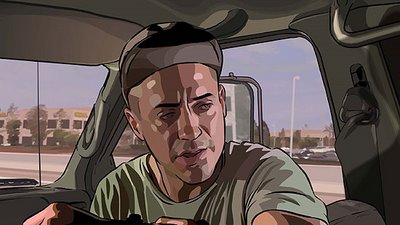
The acting is, at the least, good all around, though Downey is clearly the standout. He injects his well-known persona into the character, but adds on a layer of paranoia and deceitfulness which only makes the already-interesting Downey even more fascinating. But ultimately, it’s his sarcastic, hilarious performance that people will find themselves loving. If anyone else gave this performance, people would be talking Oscar, but since so many people already expect this kind of sardonic greatness from Downey, it’s doubtful.
Harrelson can’t match Downey, but their interplay makes for the best scenes in the movie. Harrelson does hold his own his many amusing lines and delivery, but it’ll likely be Downey that people remember.
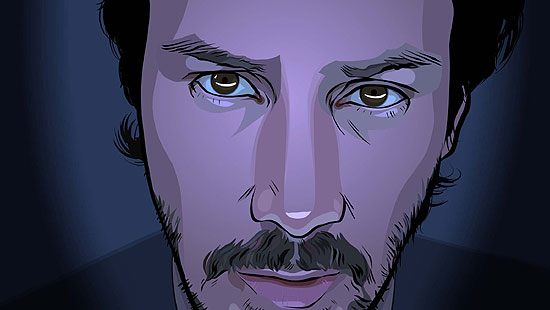
Okay, everyone seems to hate Reeves nowadays, but I’ve never despised the guy. Yeah, he’s not a good actor—at all—but occasionally, he’s fine and finds himself in the right role. There may not ever be a role as suited for his blankness as Arctor is. It’s the rare case of perfect casting, and one where his trademark blandness and cluelessness is an asset.
Ryder makes her first return to film since “Mr. Deeds” and she does a fine job, if one that doesn’t make a strong impression. She’s especially good in some scenes in the latter half of the film that require significant complexity, not the easiest thing to get across when you’re being “painted over” or “colored in” or whatever terminology you want to use.

Many (especially those looking for hardcore sci-fi) will be disappointed that “Scanner” is a rather talky affair, particularly the first half which is comprised almost completely with the inane, stoned musings of Downey Jr. and Harrelson. I reveled in these hilariously maddening scenes and was completely taken in by the dialogue, but it might elicit more than a few “what the fuck am I watching”-type remarks from mainstream audiences.
The second half is almost as talky, but delves more into Arctor’s situation and various goings-on in his “investigation” and the manipulation of his reality. There’s a few points where he has no idea what’s going on, and neither does the audience, which is part of the point. Although it gets rather convoluted towards the end, it does make sense, even if not until after a long post-movie conversation with your friends.
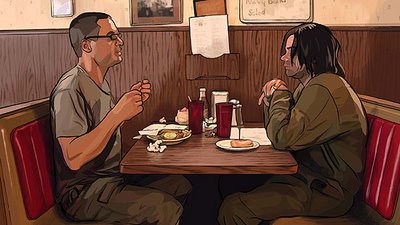
I’m actually amazed I’ve been able to write so much about “A Scanner Darkly” since much of it is still a mystery to me and I was so taken aback by my highly disruptive audience (many of whom walked out midway through). If anything though, I want to illustrate how interesting and invigorating the film is, and how much fun and thought can be engaged by discussing (or thinking about) it. I imagine I won’t be able to really talk about everything it has to offer without having seen it a few more times, which I plan to do as soon as possible.

I went into “A Scanner Darkly” having not read the novel upon which it’s based. The trailer didn’t exactly clue one in to the story either—all I knew was that (a) it was shot using rotoscoping—that trippy colored-in live action type animation—so it would likely look awesome, and (b) the novel was written by Philip K. Dick, so it was probably futuristic science fiction.
What I didn’t expect was for the film/book to be more of a parable/allegory of Dick’s drug addiction rather than an elaborate science fiction story involving time travel and dual identities. Though there are themes of the latter, “Scanner” is more grounded in reality than one may expect, just a reality slightly in the future so there is some technology we do not have yet. In any event, what the film ended up being was a lot more lyrical and powerful than I was expecting, and in the end, a lot more of a rewarding experience than had it just been a simple mind-fuck.

I certainly don’t want to fuck up the elaborate synopsis, so I’ll pull the official one from comingsoon.net:
“"A Scanner Darkly" is set in suburban Orange County, California in a future where America has lost the war on drugs. When one reluctant undercover cop is ordered to start spying on his friends, he is launched on a paranoid journey into the absurd, where identities and loyalties are impossible to decode.”
Um, yeah, so that didn’t help too much did it? Basically at this point in the future, there’s a plethora of people addicted to “Substance D,” a pill made from a purple (?) flower which often results in hallucinations and paranoia (as brilliantly shown in the jarring opening sequence). Keanu plays Bob Arctor, an undercover narc living amongst two drug-addled slackers (Robert Downey Jr. and Woody Harrelson), with a drug addict girlfriend named Donna (Winona Ryder) to boot. As expected, after much time undercover, Arctor has succumbed to the drug as well. Before long, he is not only spying on his “friends” but seemingly on himself as well. Somewhere in the mix is a visually stunning “scramble suit,” an eighteen speed bike and Woody Harrelson in a blond surfer dude wig.

Linklater has utilized rotoscoping once before in “Waking Life.” Despite being a fan of the director, I couldn’t tolerate watching all of “Waking Life.” After about 15 minutes of pretentious philosophical psychobabble, I fast-forwarded through the rest of the movie so I could still look at the pretty pictures without listening to the bullshit dialogue. “Scanner” is a lot more of a cohesive and linear experience, if still rather trippy in its own right.

I’ve been asked by more than a few people: “should I go stoned?” While I’ve wavered, I’d have to come down on the “no” side. The visuals are trippy as hell, as well as facets of the story, but overall this is a movie more about the perils of drugs, and there’s a profound sense of tragedy throughout the third act, so drugs might only amplify any sense of sadness that may occur.
The beauty of “Scanner” is in its ever subtle shifts of tone and depiction of the hard-paid price of drugs without ever getting preachy or obvious. Until the closing crawl, one could far remove themselves from the themes and just view it as a futuristic yarn. “Scanner” is often hilarious, other times it fills you with paranoia, and as I mentioned, upon closure, it just leaves you sad (in a good way).
It’s a testament to the storytelling that one leaves the theater discussing the various themes and depths of the movie rather than the mind-blowing visuals. As phenomenal as they are, they serve a purpose to the story (and spirit) of “A Scanner Darkly” and don’t call attention to themselves for their own sake.

The acting is, at the least, good all around, though Downey is clearly the standout. He injects his well-known persona into the character, but adds on a layer of paranoia and deceitfulness which only makes the already-interesting Downey even more fascinating. But ultimately, it’s his sarcastic, hilarious performance that people will find themselves loving. If anyone else gave this performance, people would be talking Oscar, but since so many people already expect this kind of sardonic greatness from Downey, it’s doubtful.
Harrelson can’t match Downey, but their interplay makes for the best scenes in the movie. Harrelson does hold his own his many amusing lines and delivery, but it’ll likely be Downey that people remember.

Okay, everyone seems to hate Reeves nowadays, but I’ve never despised the guy. Yeah, he’s not a good actor—at all—but occasionally, he’s fine and finds himself in the right role. There may not ever be a role as suited for his blankness as Arctor is. It’s the rare case of perfect casting, and one where his trademark blandness and cluelessness is an asset.
Ryder makes her first return to film since “Mr. Deeds” and she does a fine job, if one that doesn’t make a strong impression. She’s especially good in some scenes in the latter half of the film that require significant complexity, not the easiest thing to get across when you’re being “painted over” or “colored in” or whatever terminology you want to use.

Many (especially those looking for hardcore sci-fi) will be disappointed that “Scanner” is a rather talky affair, particularly the first half which is comprised almost completely with the inane, stoned musings of Downey Jr. and Harrelson. I reveled in these hilariously maddening scenes and was completely taken in by the dialogue, but it might elicit more than a few “what the fuck am I watching”-type remarks from mainstream audiences.
The second half is almost as talky, but delves more into Arctor’s situation and various goings-on in his “investigation” and the manipulation of his reality. There’s a few points where he has no idea what’s going on, and neither does the audience, which is part of the point. Although it gets rather convoluted towards the end, it does make sense, even if not until after a long post-movie conversation with your friends.

I’m actually amazed I’ve been able to write so much about “A Scanner Darkly” since much of it is still a mystery to me and I was so taken aback by my highly disruptive audience (many of whom walked out midway through). If anything though, I want to illustrate how interesting and invigorating the film is, and how much fun and thought can be engaged by discussing (or thinking about) it. I imagine I won’t be able to really talk about everything it has to offer without having seen it a few more times, which I plan to do as soon as possible.


0 Comments:
Post a Comment
<< Home